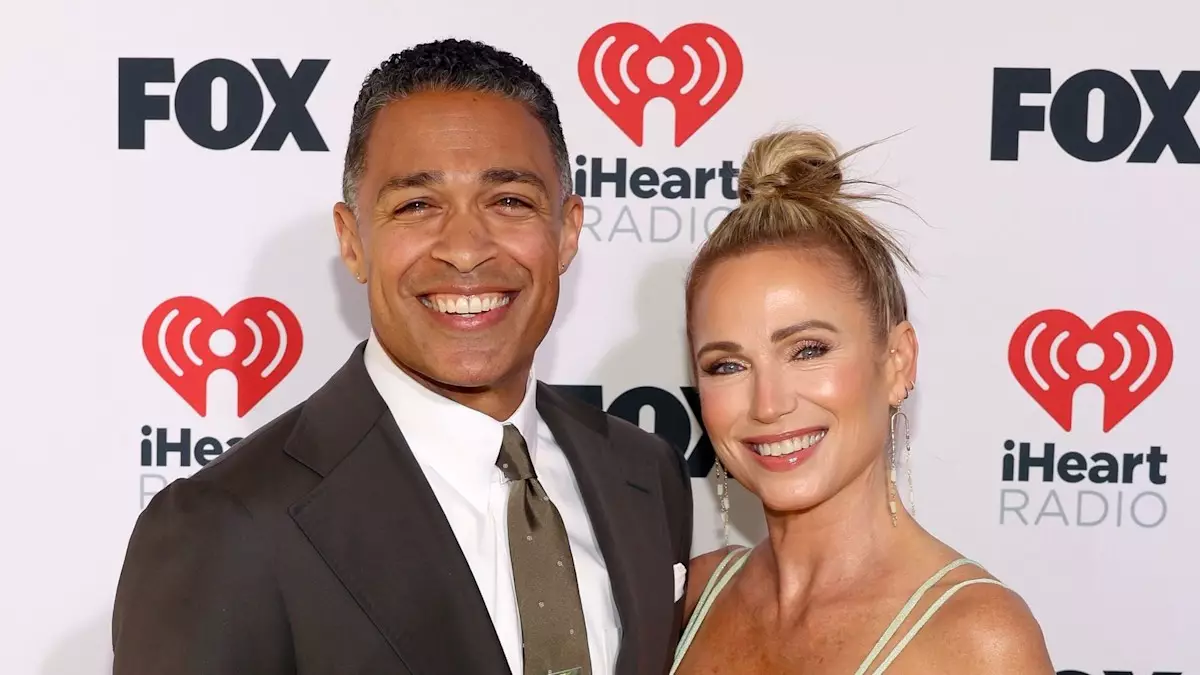In the world of competitive athletics, the line between passion and recklessness can often blur, especially for those with a penchant for pushing boundaries. T.J. Holmes, a prominent podcaster and media personality, recently found himself navigating this precarious terrain. Just days following a health scare that involved endless hospital corridors and medical evaluations, T.J. was back on the pavement, re-engaging with a sport that had contributed to his injury. His decision to participate in the Chicago Marathon alongside his girlfriend, Amy Robach, has invoked passionate responses from fans, family, and, interestingly enough, from T.J. himself.
Holmes’ account of the marathon paints a picture of resilience but also raises critical questions regarding decision-making in the face of physical adversity. After completing the race with an injury that rendered him unable to walk, T.J. shared a post on Instagram that can only be described as a defiance against both his body and the cautionary voices in his life. Despite his family’s increasing concern—his sister’s admonitions echoing in his ears—he seemed unbothered by the risks, declaring his eagerness to lace up his running shoes once again for a “1-mile test run.” The bravado is palpable, but at what cost?
In this age of digital storytelling, social media often serves as a stage for athletes and celebrities alike to share their triumphs and trials. T.J. Holmes’s Instagram showcase was no exception. Following his arduous marathon experience, he took pride in displaying a snapshot of his attempts to jog through the streets of New York City. Within the same breath, his girlfriend Amy Robach echoed these sentiments, posting reflections on their marathon journey that included not only glorious moments but also painful setbacks.
This blend of celebration and struggle is not unusual in the athletic community; many runners use platforms like Instagram to foster a connection with fans. However, it raises a pertinent issue: when does sharing experiences turn into glorifying a potentially harmful lifestyle? In the rush for likes and followers, the nuances of physical health can be cast aside uncritically. The reaction from fans was a mix of support and genuine concern, reflecting a societal tension between admiration for athletic tenacity and the necessary caution for personal health.
For T.J. Holmes, the allure of running marathons can sometimes overshadow the sobering reality of an athlete’s vulnerability. As he candidly revealed, the day started with multiple obstacles—one of which was entering the race without adequate hydration or nutrition. Reflecting on the events that transpired, even he recognized the foolishness of racing under such conditions, an admission that he termed as “stupid.” It is important to note that pushing through adversity can yield profound personal growth, but at times, it may also lead to setbacks that could have lasting consequences.
Holmes had been grappling with a recurring Achilles injury stemming from a previous marathon, which raises further concerns about long-term physical sustainability. As he navigates the implications of his decision to run despite impending dangers, it becomes clear that his story reflects a broader narrative about the sports culture—one that often champion resilience while failing to adequately address the repercussions of overexertion, especially in long-distance running.
As T.J. Holmes looks ahead to his next challenge—the New York City Marathon—it remains to be seen whether he can find a more sustainable approach to running. His drive to redeem himself after a less-than-ideal experience speaks volumes about his character. Yet, the dialogues surrounding his health and performance are ever more critical. Success should not solely be measured in medal counts and finish lines; it should also encompass an athlete’s ability to listen to their body and prioritize recovery—a lesson that many can learn from T.J.’s journey.
T.J. Holmes’s experiences serve as a reminder that the world of athletics is fueled by passion but tempered by the undeniable truth of physical limitations. The intersection of ambition and prudence is a conversation that warrants attention, especially as we celebrate the resilience of individuals like Holmes while advocating for their well-being in an era that often glorifies the struggle without acknowledging its consequences.

